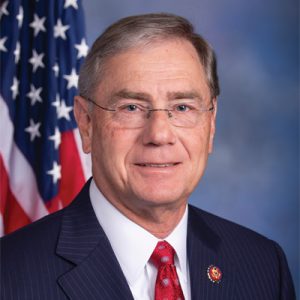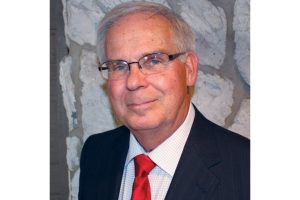2021 came with many changes: the pandemic and subsequent restrictions eased, businesses got back on their feet with the help of programs like PPP and the banks that participated and of course, our nation swore in a new President. With a new Administration usually comes a shift of ideology and rules of the road, and this was certainly no exception. Shortly after President Biden was sworn in, I sent a letter to his Administration urging them to avoid Obama-era policies that hinder businesses and get in the way of American progress. Unfortunately, President Biden not only ignored my advice, he doubled down on President Obama’s punitive policies.
Recently, the FSOC released a report regarding what climate risk means for banks and the “emerging and increasing threat” climate change is posing to our country’s financial system.
In many cases, the Biden Administration is using the financial services industry to advance its radical agenda. Treasury Secretary Yellen is seriously exploring the idea of requiring banks to include climate as a potential risk on their balance sheets. Recently, the FSOC released a report regarding what climate risk means for banks and the “emerging and increasing threat” climate change is posing to our country’s financial system. While Secretary Yellen has not publicly agreed to include climate scenarios as systemic factors, there is substantial pressure from the Left to include climate change. The notion that wildfires or flooding could potentially bring our financial system to its knees is outrageous, but it is a priority at the highest levels of the government. As you know all too well, banks have to focus on the creditworthiness of their borrowers, not the carbon footprint of their customers’ portfolios. Large, multinational institutions may have the resources to hire climate and greenhouse gas experts to help them comply and analyze climate risks, but forcing this on community banks would assure fewer small financial institutions across the country.
One of the most recent — and most alarming — proposals from this Administration has been the IRS reporting regime that would force banks to report to the IRS the inflows and outflows of accounts with at least $600. The Administration and Congressional Democrats have faced major backlash over this proposal that would put the majority of America’s financial privacy at risk, put additional costs on small businesses, saddle you with insurmountable expenses and give the IRS — the agency that has a history of leaking citizens’ tax information and targeting Americans based on their political beliefs — even more authority. We have Americans still waiting on EIP payments and 2019 tax returns. Even if this weren’t a massive overreach, the IRS is completely incapable of handling this duty.
While the proposed regime has been a significant focus of public attention and, unfortunately, a concern for financial institutions, Financial Services Committee Chairwoman Maxine Waters has yet to hold a hearing on it. To help provide transparency, my Republican colleagues from the House Financial Services Committee and Small Business Committee joined me for a roundtable recently to discuss this awful proposal. Witnesses from the National Taxpayers Union, National Federation of Independent Business (NFIB), and Independent Community Bankers of America (ICBA) all gave testimony on how the regime poses a major threat to access to credit for low-income and minority communities, infringes on the privacy of millions of Americans, and adds devastating costs on small financial institutions. The provision has since been removed from the reconciliation bill, but any proposal the Treasury estimates will raise $460 billion in revenue has a tendency to reappear. One of my top priorities is to ensure this never becomes law.
Another cause for concern for financial institutions is the people selected to oversee our economy. I don’t have to tell MIBA members that the CFPB holds enormous power. We all remember Richard Cordray’s approach to regulating, which focused on attacking business and carried out political vendettas. The new Chairman, Elizabeth Warren Acolyte, and Rohit Chopra, could very well return us to those practices. But the most concerning choice from the Administration is Cornell Law Professor and Soviet Union native, Saule Omarova, who has been nominated to serve as Comptroller of the Currency. Professor Omarova has publicly romanticized the Soviet Union stating, “[s]ay what you want about old USSR, there was no gender pay gap there. The market doesn’t always ‘know best.” She has also publicly supported the idea of Fed bank accounts as they would “end banking as we know it” and spoke on the need to bankrupt U.S. energy companies in the name of climate change. These statements from the potential primary bank regulator in this country are absolutely chilling. While the House does not have jurisdiction over the confirmation of the President’s nominees, I’m hopeful the very narrow margins in the Senate and increasing concern from both sides of the aisle will allow common sense to prevail.
It is not my goal to place a dark cloud over the holiday season. These are not partisan talking points or an attempt to sway anyone’s views. This is a true account of what has gone on this year and what will shape the coming year for financial services. The overregulation, record-high inflation, supply chain interruptions, and potential tax increases are serious concerns that families, bankers, and policymakers alike must consider going into 2022. Despite all of that, the U.S. is still the best place on earth to do business. We still have the economic freedom to chart our own path and provide for our families. Banks are the foundation of that economic freedom, and there are still people in Washington, D.C. who understand that. We have many challenges, but I assure you, in my capacity on both the House Financial Services and House Small Business Committee, I will keep up the fight to allow you to do your jobs and allow your customers to continue creating them.










